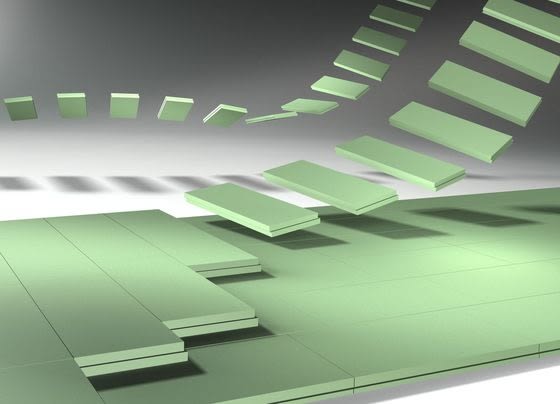 The Deutsche Institut für Bautechnik [German Institute for Building Technology], Berlin has now officially approved Styrodur 3035 CS, Styrodur 4000 CS and Styrodur 5000 CS (XPS: extruded polystyrene rigid foam) from BASF for double-layer installation in inverted roofs.
The Deutsche Institut für Bautechnik [German Institute for Building Technology], Berlin has now officially approved Styrodur 3035 CS, Styrodur 4000 CS and Styrodur 5000 CS (XPS: extruded polystyrene rigid foam) from BASF for double-layer installation in inverted roofs. After years of research BASF has proven that the double-layer installation of Styrodur C in the inverted roof is possible in terms of construction physics. This means that the inverted roof, which offers several advantages for flat roofs, can be applied to meet particularly stringent insulation requirements as well. Insulation material thicknesses up to 400mm are now permitted.
An inverted roof is a flat-roof construction, in which the insulation material lies above the waterproofing, creating a layered structure that combines energy-efficient thermal insulation with long-term structural protection. This design is made possible because Styrodur C absorbs hardly any water due to its closed-cell foam structure and the foam skin on both sides. Styrodur C has been officially approved since 1978 for use in inverted roofs. Up to now, only the single-layer installation of XPS was permitted in inverted roofs.

The insulation panels for double-layer installation must be covered with a water-repellent and permeable separating layer in such a way that most of the rainwater runs permanently and securely off the surface. Thus, existing inverted roofs with single-layer insulation can be renovated so that they comply to modern insulation standards. They can be upgraded at low cost and under any weather conditions by supplementing the existing waterproofing and insulation by a second insulating layer of Styrodur C and by a separating layer.
Also new buildings with particularly effective thermal insulation can now reap the benefits of the inverted roof and so comply to the latest energy consumption standards: In the inverted roof, the waterproofing is protected by the insulation layer against thermal and mechanical stress. So, the service life of the roof is considerably prolonged.
Pressure-resistant, water-repellent and rot-proof Styrodur C has been protecting homes against heat, cold and moisture for more than 45 years. This prolongs the life of buildings, increases their value and improves the living climate. The various types of Styrodur C, which contain air as cell gas, are distinguished mainly by their compressive strength.



